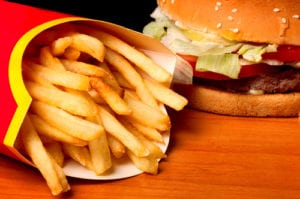With several popular fast-food options today like McDonald’s, Wendy’s, Taco Bell, Burger King and more, obtaining quick, relatively inexpensive food is more attainable now than ever. While many find the convenience of these restaurants alluding, fast food isn’t always the best (and healthiest) option. One Green Planet, a website aimed at growing a compassionate and eco-conscious generation, breaks down several components of fast food that are both unhealthy and factor into addiction:
- Sugar, fat, and salt. Although these are quite standard in restaurants and home cooking, these ingredients are highly processed in fast food restaurants. High fructose corn syrup and hydrogenated/partially hydrogenated oils take the form of these ingredients, and they lead to weight gain and increased bad cholesterol. These three ingredients, when combined, can trigger individuals to keep coming back for more, which leads to addiction.
- Monosodium Glutamate (MSG). This is a flavoring agent consisting of concentrated salt and is used to enhance the flavors of foods. Because this is highly processed, One Green Planet has noted that there have been reports of skin rashes, itching, hives, vomiting, asthma, heart irregularities, headaches, migraines, nausea, weakness, and more.
- Casein. Often referred to as the “nicotine of fast food”, this protein compound is an addictive property often found in milk, but is refined and highly processed by adding calcium hydrogen phosphate to concentrated milk solids. This is often found in French fries, buns, milkshakes, creamy salad dressings, whipped toppings, and more.
Healthline states that processed junk foods have a powerful effect on our dopamine “reward centers” of the brain. There are several signs that you may be addicted to fast-food:
- Getting frequent cravings for certain foods, even if you are full
- Eating much more of the fast food than you intended to and even feeling “stuffed”
- Feeling guilty about eating certain foods but continuing to eat them anyways
- Making excuses about why you should eat certain foods
- You have repeatedly tried to quit eating certain foods but have been unsuccessful
- You hide your consumption from others
- You feel unable to quit your eating habit, despite its negative consequences such as weight gain
Dr. Joshua Gowin, a postdoctoral fellow for the National Institute of Alcohol Abuse and Alcoholism, provided for Psychology Today that fast-food is a problem because sugar is addictive, there is a perceived “convenience”, value meals tap into our brain’s “saving” mindset, our brain craves high-calorie foods, and more. With these mechanisms working against us, we must be actively conscious of what we are consuming and how this is affecting our health.
If you are addicted to fast food, speak with a health care professional today. Recovery is possible and with the right support system, you can turn your life around. Avalon Malibu is known for providing exceptional care, and you will feel right at home. Our residential centers provide holistic, integrative care, meaning that you will have a support team that cares about your mind, body, and spirit. Call us today at 855-411-8078.











